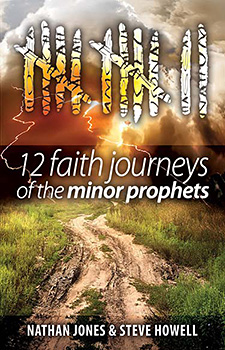When God Seems So Distant
Understanding the Heart of Our Heavenly Father

Have you ever attended a White Elephant Party? No, I’m not talking about some pale pachyderm popping out of a pastry. Rather, these are parties where attendee gifts are more likely to be of the flea market persuasion, and the more creatively weird the better. It’s all a lot of fun, that is, as long as the receiver of these kinds of gifts isn’t a birthday boy or your wife. If they are, and they’re receiving Great Aunt Betty’s pig-shaped soup bowl, then well, you’ll likely end up visiting the dog house. For these important people in our lives, especially on their special day, only the best gifts will do.
Once there was a people who believed they only needed to give God white elephant gifts. It’s a fantastic little story found in the last Old Testament book of Malachi. The Minor Prophet uncovered poignant insights into the heart of a Heavenly Father who had been receiving second, and even third best.
Facing the Menagerie
One day the Prophet Malachi had been standing outside of the Temple, mouth agape, watching with incredulity as the priests readily accepted one sorry excuse of a sacrifice to God after another. Mosaic Law required the best of the flock, the unblemished and the healthy. Instead, the people reluctantly dragged in shabby goats with broken horns, sickly lambs with eye infections, and bulls so old they might just die before reaching the butcher block. Burdened to the point of exasperation, God’s prophet readied himself to set the stingy bunch of worshipers straight about what loving God truly meant.
Malachi shouted out so that the unruly crowd of half-hearted devotees could not miss him, “The Lord says, ‘I have loved you!’ Yet you say, ‘In what way have You loved us?'” Thus Malachi had begun a series of seven literary disputations, where God pronounced a statement and the people responded by brazenly questioning the truth of God’s claims (1:1-5). In each case, the people threw God’s statements back at Him like moody teenagers questioning their parents. And these people were at the Temple to worship!
In His first statement, God reminded the people just how special Israel had been to Him over the centuries, giving historical examples of His great love. But, the people, they just wanted to know what God had done for them lately.
Malachi presented God’s second statement, this time against His own corrupt priests (1:6-2:9). “If then I am the Father, where is My honor? And if I am a Master, where is My reverence?” The priests questioned, “In what way have we despised Your name? In what way have we defiled You?” God responded by pointing out the obvious — the sacrificial animals were appalling! Blind, lame, sick, and even stolen, the guardians of God’s grace that covered the people’s sins were shaming Yahweh’s name.
Aghast at the obvious, Malachi spit forth God’s third statement (2:10-16). “Judah has profaned the Lord’s holy institution which He loves.” The people scoffed with, “For what reason?” The holy covenant of marriage was being treated with casual contempt as divorce rates skyrocketed, demonstrating the treacherous people were unfaithful. Therefore, God rejected their offerings. Even if they were to weep and wail, which they wouldn’t, God would ignore their faithless sacrifices.
God sighed deeply in utter weariness at His people’s hard hearts and constant questioning (2:17- 3:6). The prophet in this fourth statement revealed, “You have wearied the Lord with your words.” Demonstrating no sympathy, the congregants squealed, “In what way have we wearied Him?” And with a snap remark they added, “Where is the God of justice?” Ouch! The insolent people just accused the God of the Universe of delighting in evil. Patiently, God promised true justice when the ultimate Judge — the Messiah — arrived.
Malachi presented God’s fifth statement, this time a magnanimous plea (3:7). “Return to Me, and I will return to you.” Like an angry toddler who doesn’t get the toy he wants, the stubborn people spit, “In what way shall we return?”
In His sixth statement, God leveled an accusation, “You have robbed Me!” (3:8-12). The guilty people merely hid their pathetic animals behind their backs, batted their eyes, and replied innocently, “In what way have we robbed You?” God challenged them that if they sacrificed with generous hearts, He would bless them beyond measure. Sadly, the people’s hearts were stingy, for they didn’t trust God to follow through.
In the seventh and final statement, God lamented, “Your words have been harsh against Me” (3:13-15). In an embarrassing display of ignorance, the people scoffed, “What have we spoken against You?” And then they immediately spoke against Him: “It is useless to serve God.”
Defining the Distance
God had enough of these faithless people and their casual indifference to His Law. They had spurned God’s love, so God would shut His mouth…for 400 years!
While a majority will always reject God, just emotionlessly going through the motions of worship, a believing remnant always exists that responds positively in repentance to God’s Word. Malachi ended with a promise to the faithful few who feared the Lord: “They shall be Mine” (3:16-4:6). When the Day of the Lord’s judgment finally arrives, God’s “jewels” shall be spared.
God will always seem distant to those who, in truth, want Him to be distant. But, for those faithful who love the Lord and give Him their best, “God is our refuge and strength, an ever-present help in trouble” (Psalm 46:1).




